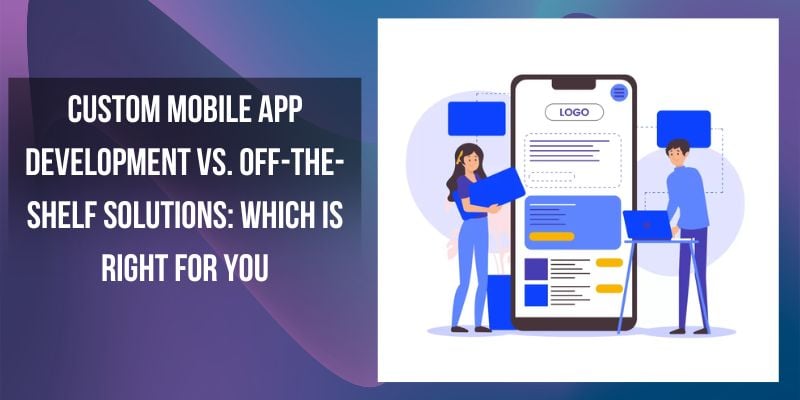The development of mobile apps is becoming increasingly essential with each new day. With the rise of mobile users over desktop use, it's logical for businesses to be accessible on mobile devices. The most effective way to accomplish this is by using the mobile application.
When developing mobile applications, you can opt for ready-made, off-the-shelf white-label solutions or custom mobile app development.
How do you determine whether you should choose an existing solution or develop it entirely from scratch when you hire an application development company?
We are here to provide the answer. In this blog, we'll examine alternatives to off-the-shelf mobile apps and bespoke Mobile app creation services.
Let's start the discussion by learning more about these two renowned mobile app development techniques.
Concept of Building a Custom App
The development of custom mobile applications involves creating a custom-built app that is adapted to your business's requirements and provides distinctive features. In the case of enterprise solutions, custom applications for businesses are in high demand as, usually, the off-the-shelf apps only cover the essential requirements and do not deliver the desired features.
In general, there are two options to create custom-built software. The first is to assign internal resources and create an internal team that will focus on developing an application. Another option is outsourcing the development of your app to a third party. This can provide a variety of advantages, including reduced costs, speedy project delivery, and extensive experience.
The current conditions in the IT market, where there is a dearth of software engineers, is another reason to join forces with an IT firm and outsource the creation of a customized app to them. Therefore, you do not have to search for a team to work on the project.
Read About: An Overview of Custom Mobile App Development Process 2024
Defining Off-The-Shelf Mobile App Development
Off-the-Shelf mobile apps are pre-made applications that require minimal to no modifications before they can be launched. They are suitable for nearly all kinds of apps, including customer service, e-commerce, travel and hospitality, and delivery on-demand.
Most of the time, off-the-shelf mobile applications can be purchased by subscription. The amount you must spend to get one depends on several aspects, such as the size of your team, the features, the set, and the time frame.
While you can get an off-the-shelf mobile application for just about everything, they're mostly solutions for bookkeeping and accounting, document processing, dealing with customers' requests, and online shopping.
Advantages of Off the Shelf Application
Applications that are available off the shelf or pre-made application comes with numerous advantages for companies and makes it an attractive alternative. Let's look at these together right now.
By choosing this option, the business decides to choose an application that has been tested and recommended, is less likely to suffer application failures, and can provide assistance.
Off-the-shelf systems are designed to satisfy the requirements of a specific industry. The application that has been tested can greatly improve the company's existing business practices.
They are simple to install and user-friendly. They are also based on other software's most effective functions or components, which add additional benefits.
The choice of a pre-made program is affordable because of its simple installation. The software is affordable, and the issue of it becoming obsolete and outdated is gone since experts from web-based application development companies keep updating it.
The majority of these apps are available as SAAS. Subscription models eliminate the need to invest in network infrastructure and purchase the full license. These options are ideal for start-ups with high budgets.
Implementing leading software from a top brand like Microsoft, SAP, etc., introduces industry-leading methods. This enhances and improves a company's overall operation.
Disadvantages of Off the Shelf Application
Let's examine the disadvantages of an off-the-shelf product and any potential pitfalls you might encounter while selecting the right one.
This program has the "One size fits all" generic features for more complicated applications. It can also be customized. Sometimes, however, the organizational requirements may differ and be restricted. Therefore, a lot of 'not needed features are also added together.
A major issue that could be solved is compatibility. If the system isn't compatible with the current infrastructure, it will use a large amount of money to alter the current IT infrastructure. The modifications that are made to the new application must accommodate the other applications that were previously installed. It is a requirement for active participation by the internal IT teams with a clear route.
The cost of new infrastructure mentioned in point 2 can be avoided by using subscription models. However, SAAS models are not customizable and typically not adjustable. This means that several vital processes could be left unautomated. Furthermore, companies need to adapt their methods to the application flow, which takes time and requires Training and Learning funding.
One drawback worth noting could be the license structure. The top companies like SAP, Microsoft, etc., are not involved in the development of products directly. They sell licenses. Third-party implementation partners handle the implementation. Because of the licensing cost, the application is only accessible to a limited number of users. Additionally, the success of implementation is contingent on the implementation carried out by the consultants or partners who are hired.
The most effective applications for Ready-Made are solutions for businesses looking to find the most cost-effective and reliable solutions. They require the system to be installed as fast as possible to get a rapid increase in return.
Defining Custom Mobile App Development
Custom-designed application development services can help create a mobile application solution that is distinct and unlike any other app on the market. While it may have features similar to those of other apps in the same field, it's unique in its own way.
While mobile apps custom-designed for specific purposes are usually used by large corporations, advances in mobile app development have made them affordable for medium-sized or even small-sized businesses.
While custom-designed mobile applications are needed in nearly every industry, they are essential for logistics, healthcare, and FinTech application development.
The main costs in developing custom mobile apps are the implementation timeframe, size, complexity, and features.
Advantages of Bespoke Application Software
It's always challenging to decide if your business needs custom application development. However, the following advantages of bespoke software development can help you make the right choice.
If the application's procedure is new or unusual and unique, it is not easy to find a professional to offer any solution. In such situations, this is the only choice. The companies have their IT and functional teams or outsource the technical development.
The benefit of custom-made software applications is that they are tailored to the business's specific requirements, which allows the most important business goals to be fulfilled.
Custom web applications are built with scalability in mind, allowing business growth and scaling down. The structure grows with the company, ensuring an ongoing, perfect fit.
Bespoke application development gives you total access to the code source. After the app is created, this customized software can be sold to other businesses in the same field and could generate additional revenue for companies.
Disadvantages of Bespoke Application Software
The disadvantages listed below for custom application must be carefully assessed before deciding whether or not to employ a skilled development team.
The process of creating software is a challenging job that requires highly competent people and requires lots of time.
The cost of bespoke, flexible application development could be more expensive than that of pre-made solutions. The resources needed to build and maintain a custom application quickly add up to an enormous cost.
The functions of bespoke software are restricted by the company's definition of the term and the developers' comprehension. Uncertainty in the software's scope could cause delays and greater capital investment.
Read Also: Mobile App Development Guide: From Concept to App Store
How Custom Mobile Applications Can Help Businesses?
The numerous advantages of custom solutions are enough to encourage many companies to choose them. Usually, the application designed specifically for your needs improves your business's efficiency and helps you outdo the rest.
A custom-designed app allows you to work with the most control by defining a list of features that it will include, governing the method of project delivery, transparency on development costing, and full control over the application at the final stage.
We've outlined the main advantages of custom applications to help you make the right choice.
Apps Are Tailored to Your Needs
As we mentioned above, your business has special requirements. Your app should address the needs of your business. App customization is the flexibility that can be incorporated into the goals of your business.
A trusted software vendor considers each customer as an individual with unique requirements. The customization process begins with business analysts determining the core of your company's objectives.
They translate your business needs into application functionality, considering the specifics of your platform and hardware choices.
Functionality that Meets Your Specifications
Canned solutions are pre-packaged with numerous unwanted add-on features. The app turns into a random assortment of tools that eat away valuable resources and consume users' time. This is detrimental to the success of your application.
On average, they have about 80 apps downloaded on their smartphones. However, they use just 30 apps each month and open just nine apps daily.
The majority of mobile app developers focus on applications that perform one task extremely well. The mobile app that is all-in-one falls in this area.
Flexible Support and Maintenance
If you partner with a reputable software company that can build customized solutions, you will save cash in the long run. Developing mobile apps according to specifications helps maintain them and makes them less expensive over time.
A best practice is to allocate around 10 percent of your development budget every year to updating your application. This will ensure that your app is compatible with the most current mobile OS version and keeps the app fresh and in line with the most current UI/UX trends.
Scalability You Can Control
No one creates an app for mobile devices to languish in Google Play or the App Store. Instead, you would like the app to expand.
Canned solutions may not provide these features. Conversely, custom applications are generally created with an eye on scalability possibilities.
Furthermore, the licensing cost could be too high when the app expands. Many app builders like AppGyver and Appian are becoming more expensive as you grow.
This renders the system less appealing for companies that rely on these platforms to run mobile apps.
Advanced Integration Opportunities
With a myriad of mobile applications in the market today, it's important for your platform to connect easily with other software. We develop native mobile applications that can easily connect with third-party services such as Salesforce, RingCentral, PayPal, QuickBooks, and more through an API.
Personalized Customer Support
Unsurprisingly, canned solutions do not provide a great deal of customer assistance. In contrast, a custom-built app includes a whole team involved in your project. You can contact the project manager, the account manager, and the developer anytime you experience issues with the application.
Security That You Control
Did you know that as high as 95% of mobile apps are vulnerable to security threats? This means you must have top-quality security for your application. Numerous companies offering canned mobile apps aren't always rapid in coming out with solutions.
JPLoft doesn't rely on simple user or password authentication. Instead, we utilize secure encrypted methods that our enterprise customers have selected.
Is Custom Mobile App Development a Better Investment?
Today, businesses are increasingly embracing digital options because they provide superior customer experience. Additionally, they can help companies grow into 2024 and beyond.
Since the COVID-19 epidemic, the creation of mobile apps has increased. The table of comparatives shows that it is more profitable to focus on developing custom mobile apps to ensure your businesses are ready for the future.
In addition, in a survey, 72% of businesses intend to invest in bespoke mobile applications. Now, that's huge! Here are some fascinating ideas on why you should consider mobile app development a wise investment. Before you jump into the mobile app development craze, read for more information.
Customization, Hyper-personalization, and Scalability
As an app owner, one of the most important things is planning your UX/UI strategy and usability.
A standard UI with standard apps won't help you in this case. Consider creating specific plans to test, validate, and create user experiences that exceed expectations.
Another important aspect is having an online solution that can help you adjust to the evolving business environment.
Therefore, you must determine the amount of customization required to meet your company's needs. Then, you can search for a customized solution that offers the extensive scale and assistance you need to develop and deploy your app.
You can always opt to partner with an experienced mobile app development company, like JPLoft, who can offer the most up-to-date, robust, long-lasting technology solutions.
Ownership of Intellectual Property
Imagine that you are investing in a program but don't have your source code!
In other words, whenever demand for a product changes, the app's developer is obligated to provide the necessary changes or improvements. In addition, you might wish to have the source code available for seamless integration with existing applications.
Without ownership rights to intellectual property, a dependency loop can become an obstacle to expanding functions and functions.
In these situations, selecting custom application development is always beneficial, as it allows you to control your source code.
Limitless Possibilities
Mobile apps tailored to your needs can cater to various business requirements.
Therefore, you could develop apps for customer relationship management platforms (CRMs),an e-commerce marketplace with logistical BPA, business process automation (BPA),and much more. The possibilities are endless.
Furthermore, you can begin with a cost-effective solution and increase it as your business expands. This model will help you integrate the most current best practices quickly.
Enhanced Security
The security of your data is of utmost importance, as hacks and data breaches are growing exponentially in the current digital age.
Creating a customized mobile app can give you the power to choose the best data-security technology or protocol pertinent to your business and incorporate those methods into your application.
Protecting and Extending Your Brand Identity
It's always beneficial to have a customized technology that effortlessly connects and extends branding across different platforms.
If your users see the same elements across multiple platforms, it is the benefit of brand recognition.
Therefore, you should devise elaborate strategies to give your customers a personalized experience.
Assured Long-term ROI
With custom-designed mobile apps that you create, you own your own software program, which can help you achieve better ROI and increased efficiency. In addition, they prove financial viability in a measured manner in the long run.
Also Read: Top Mobile App Development Frameworks in 2024
Examples of Top Successful Custom Mobile Applications in the Market
You now know why developing a custom-designed mobile app is worth the effort. Let's look at some successful companies that have outperformed their competition by developing custom mobile apps.
1. Uber
Uber application is a huge success tale that gives users access to a frictionless service and excellent experiences for riders and drivers. Today, it is an undisputed leader in the ridesharing market, using innovative strategies.
Here are a few aspects of the app that can be customized:
Geolocation is a seamless integration to track a device's location.
Point-to-point directions are available on maps within the application, making navigation simple.
Push notifications are sent and received by SMS.
Automating pricing and ensuring the most competitive prices for rides.
Schedule rides for later times as per the rider's schedule.
2. Netflix
Netflix has made huge strides since it was struggling to be competitive with its competitors. However, it's an entirely different situation today. Netflix has been redesigned as a platform with new features and custom application development.
The major changes include the distribution of top box office and cult classics from all over the globe. Furthermore, a subscription is less expensive than the cost of just one film at the theater.
What have they achieved with the development of custom apps? Here's a glimpse.
The content suggested is based on the viewer's previous viewing habits.
Generation of subtitles in multiple languages.
Enhanced viewing through personalization of the content.
Back-end technology allows for seamless viewing across all devices.
3. Amazon
Nowadays, when people think of a shopping experience on the internet, whether its electronics or apparel, Amazon is one of the first shoppers who want to explore. Over time, Amazon expanded its reach to a variety of items, ranging from clothes to food.
Later, the company employed its application development technology to gather essential information to make the products available to customers' needs.
Additionally, the company ensures that customers have a great shopping experience and a hassle-free purchase. Returns are processed electronically without any hassles, enhancing the overall experience for customers.
Conclusion
Mobile apps dominate the business world. We have mobile apps for nearly anything, whether ordering food, booking a taxi, or purchasing food items.
Each has advantages and drawbacks. However, businesses might find that off-the-shelf applications are not the best choice for their needs and goals in the short and long term.
The market for mobile app development is expanding at a steady pace as companies look for ways to engage their customers in fresh and creative ways. Custom mobile apps offer a variety of benefits that can help you achieve and surpass your business goals. Customized solutions should meet your company's requirements and be designed to meet future requirements. While apps off the shelf may be appealing and convenient initially, mobile apps created specifically to meet your company's and users' needs are typically the most effective option.
Frequently Asked Questions (FAQs)
1. What is custom mobile app development?
Custom app development involves creating mobile apps bespoke to satisfy different sets of needs. A mobile application could be entirely or partially custom-designed. Most of the time, these apps are designed to meet the requirements of a particular user.
2. How do I create a customized mobile application?
After you've created your mobile application concept, it is important to choose either a native application, web app, or PWA. The next step is to develop your app independently or work with an experienced development team. Test the app on the devices you want to use, and then release it in the app stores.
3. What is a custom-made app design?
Custom design is the process of creating a custom layout for mobile applications instead of using pre-built layouts, themes, etc. The list goes on.
4. How can you identify the most reliable mobile app development firm?
Create a list of possible options and review each company that offers custom mobile apps. Reviewing their contact information, including their portfolio, past projects, and projects with clients, will aid you in selecting the most suitable custom mobile application development firm to meet your business's needs.








